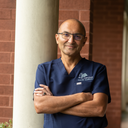Should I be worried about the possibility of dying under anesthesia? I have a 5 year old and I'm thinking worst case scenario.
I will be getting a septo/rhinoplasty done. I have a deviated septum as well as nasal valve collapse. My symptoms are generally not feeling like I can breathe well, and the constant phlegm in my throat. I'm just not sure if I should get this surgery. I'm hoping to find out the risks. I have mild asthma, and am overweight but not obese. I am 25 years old. Thank you for your time in reading this.





